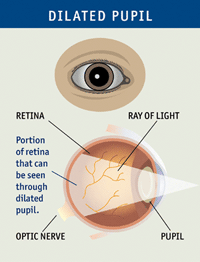

Ask the Doctor
Why does my doctor put drops in my eyes to dilate my pupils?

Nida Sen, M.D., M.H.S.
Staff Clinician
National Eye Institute
Your doctor needs to widen, or dilate, your pupils to get the best look at what's going on in the back of your eye, says NEI's Dr. Nida Sen. He or she will usually give you numbing drops first, and then two different types of dilating drops to widen your pupils for a full examination.
"The doctor sees your optic nerve and the blood vessels in your retina during a dilated eye exam," Dr. Sen says. Doctors look for any changes of the optic nerve that could be a sign of glaucoma or other medical problems. They also evaluate the quality of the blood vessels, as well as the way they cross each other. Any changes in the optic nerve, retina, or blood vessels since your last eye exam could indicate that you have an eye disease.

In addition, eye health can speak volumes about other conditions including high blood pressure and diabetes. "We can see changes that are related to the eye, and also to overall health," she explains.
After the exam, your pupil will typically remain dilated for three to four hours. During this time, you may have blurry vision, especially during near-work such as reading, Dr. Sen says.
The NEI recommends that everyone over the age of 60 and people who have diabetes should have comprehensive dilated eye exams at least once a year. Also, you should visit an eye care professional promptly if you experience problems with your eyes.
Read more information about dilated eye exams.

